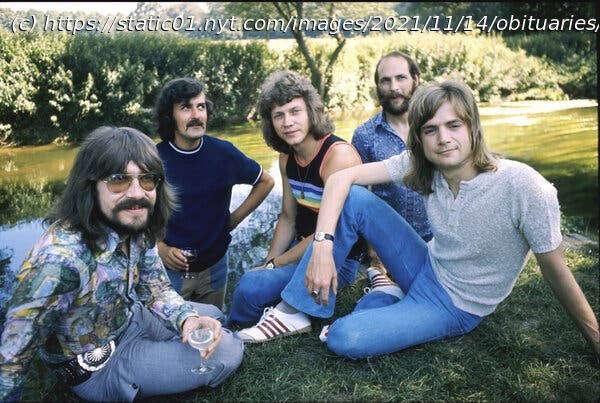Many of their songs incorporated his spoken-word poetry, making them pioneers in the prog-rock movement of the late-1960s and ’70s.
Graeme Edge, the drummer and co-founder of the British band the Moody Blues, for whom he wrote many of the spoken-word poems that, appended to songs like “Nights in White Satin,” made the group a pioneer in the progressive rock movement of the 1960s and ’70s, died on Thursday at his home in Bradenton, Fla. He was 80. Rilla Fleming, his partner, said the cause was metastatic cancer. The Moody Blues first gained attention as part of the British Invasion that dominated the American rock scene in the mid-1960s. Their repertoire originally consisted largely of R&B covers, but by their second album, “Days of Future Passed” (1967), they had developed the blend of orchestral and rock music that would make them famous. “In the late 1960s we became the group that Graeme always wanted it to be, and he was called upon to be a poet as well as a drummer,” Justin Hayward, the band’s lead singer, wrote in a statement on the Moody Blues website after Mr. Edge’s death. “He delivered that beautifully and brilliantly, while creating an atmosphere and setting that the music would never have achieved without his words.” Mr. Edge’s mesmerizing drumming and introspective poetry were a big part of the group’s success. The Moody Blues are probably best remembered for “Nights in White Satin” (1967), a darkly ruminative song that ends, in the original album version, with “Late Lament,” written by Mr. Edge and read by the keyboardist Mike Pinder. (It was missing from the shorter version released for radio.) Though Mr. Pinder’s sonorous baritone and the poem’s opening lines — “Breathe deep the gathering gloom” — make the poem sound melancholy, even foreboding, it was meant to be uplifting, Mr. Edge said. “I think it’s the joy, the spirit that makes it,” he said in an interview with Rolling Stone in 2018. “It’s a young boy discovering that he loves somebody for the first time, and he just wants to shout it out from the hills — and shout it out again!” “Nights in White Satin” was not originally a hit, but it reached the Top 10 when it was rereleased in 1972.






